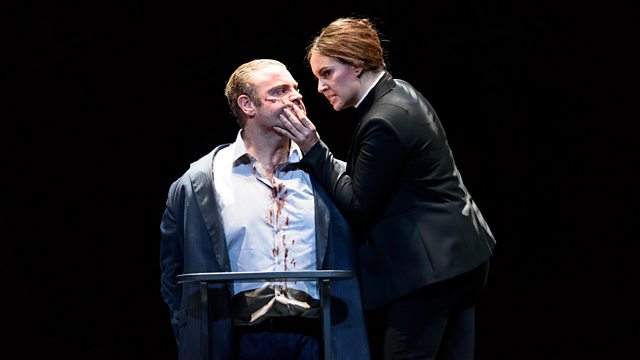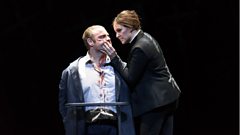
Bellini's Norma
From the Royal Opera House in Covent Garden, a new production of Bellini's Norma. Soprano Sonya Yoncheva is Norma, with Joseph Calleja as the unfaithful Pollione.
Ivan Hewett presents a new production of Bellini's Norma from the Royal Opera House, Covent Garden's first for almost 30 years. The Druid priestess Norma is in love with the leader of the occupying Roman forces, Pollione, and has secretly borne two children by him. When she discovers that he has transferred his affections to another priestess, Adalgisa, it begins a downward spiral leading to her self-sacrifice. Bellini's grand setting contains a very personal story of a woman struggling to combine her own desires with society's expectations, and shows the power of religion as a force for good, and for destruction. In La Fura dels Baus's production, directed by Alex Olle and recorded last month, Bulgarian soprano Sonya Yoncheva leads a stellar cast, with Joseph Calleja as the unfaithful Pollione. Ivan Hewett is joined in the box by Italian opera expert Roger Parker to discuss the history and significance of Bellini's work, and also talks to Associate Director Valentina Carrasco, conductor Antonio Pappano and members of the cast.
Norma ..... Sonya Yoncheva (Soprano)
Pollione ..... Joseph Calleja (Tenor)
Adalgisa ..... Sonia Ganassi (Contralto)
Oroveso ..... Brindley Sherratt (Bass)
Flavio ..... David Junghoon Kim (Tenor)
Clotilde ..... Vlada Borovko (Soprano)
Royal Opera House Chorus
Royal Opera House Orchestra
Antonio Pappano (Conductor).
Last on
More episodes
Previous
Music Played
-
![]()
Vincenzo Bellini
Norma Act I
Singer: Sonya Yoncheva. Singer: Joseph Calleja. Singer: Sonia Ganassi. -
![]()
Vincenzo Bellini
Norma Act II
Singer: Sonya Yoncheva. Singer: Joseph Calleja. Singer: Sonia Ganassi. -
![]()
Giuseppe Verdi
String Quartet in E minor
Ensemble: Delme Quartet.- Verdi/Strauss: String Quartets: Delmé Quartet.
- Hyperion.
- 1-4.
Synopsis
Oroveso and his followers leave as Flavio and Pollione, members of the occupying forces, arrive. Pollione confides in Flavio that he once loved Norma and has two children with her, but he has now tired of her and fallen in love with her friend Adalgisa. He is terrified of Norma’s anger if she finds out, and recounts a dream in which a phantom pursued him and Adalgisa to announce Norma’s revenge (Meco all’altar di Venere).Hearing voices, the two men leave.
Norma and her followers prepare for their ceremony. Norma counsels the people against war and prays for peace (Casta diva) – but she also promises to lead a rebellion when the time is right. Norma’s people order that her first victim be Pollione. Norma admits to herself that she cannot kill her former lover, and that if Pollione returns to her she will even defend his life (Ah! bello, a me ritorna).
After the ceremony, Adalgisa expresses her guilt over her relationship with Pollione,and prays for the strength to leave him (Deh! proteggimi, o dio). Pollione finds her,and urges her to run away with him (Va, crudele, al dio spietato). Adalgisa overcomes her reluctance and promises to renounce her vows and escape with him.
Scene 2Norma has heard that Pollione has been recalled to his homeland, and is anxious.She hears someone approach, and asks her confidante Clotilde to hide her two children.The visitor is Adalgisa. She confesses that she is in love with a man who she first met by chance (Sola, furtiva, al tempio). She describes their regular meetings and their love.Norma, remembering her own love affair, is sympathetic, and agrees to release Adalgisa from her vows (Ah! sì, fa core e abbracciami). She asks Adalgisa for her lover’s name; Adalgisa names Pollione just as he arrives. Norma tells Adalgisa about her own relationship with Pollione and denounces him (Oh! di qual sei tu vittima). Pollione admits that he now loves Adalgisa, and again begs her to leave with him. Adalgisa refuses and Norma orders Pollione out of the house (Vanne, sì: mi lascia, indegno).
Act IIScene 1Norma watches her children sleeping, and worries about their future. She decides to kill them to prevent their suffering when their parentage is revealed (Teneri, teneri figli).However, she loves them too much to commit murder, and instead orders Clotilde to bring Adalgisa to her. Norma suggests to Adalgisa that she marry Pollione, and take the children with her to his country, but Adalgisa wants to try to persuade Pollione to returnto Norma (Mira, o Norma). The women vow eternal friendship (Si, fino all’ore estreme).
Scene 2��Pollione has been recalled to his country. Oroveso warns his followers that a more tyrannical governor may take his place, and worries about Norma’s lack of interest in the people’s struggle. He urges his followers to wait patiently; soon they will have their revenge (Ah! del Tebro al giogo indegno).
Scene 3Clotilde informs Norma that Pollione will not return to her, and is planning to abduct Adalgisa. In revenge, Norma gives the sign for her people’s rebellion to begin. The people sing a ferocious war hymn (Guerra, guerra! Le galliche selve). Oroveso asks Norma why she has not completed her sacrificial rite, and she replies that the victim is now ready. Pollione is dragged in – he has been found nearby. He refuses to respond to Oroveso’s interrogation. Norma prepares to kill Pollione, but finds she cannot do so. She ordersthe others away, leaving her alone with her former lover.
Norma offers Pollione his freedom if he will abandon Adalgisa (In mia man alfintu sei). Pollione refuses, and Norma threatens to kill him and their children and have Adalgisa burned alive.
Norma recalls the people, and announces that the sacrifice will be a guilty priestess.When Oroveso and the people ask who this is, Norma condemns not Adalgisa (as Pollione expects), but herself (Qual cor tradisti). Oroveso only now learns the truth of his daughter’s situation. She begs him to spare her children and look after them, and he reluctantly agrees (Deh! non volerli vittime). Norma and Pollione die together.
Broadcast
- Sat 5 Nov 2016 18:3091�ȱ� Radio 3


